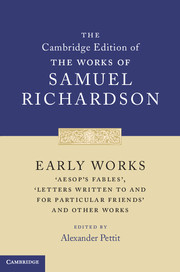Book contents
- Frontmatter
- Dedication
- Contents
- General Editors’ Preface
- Acknowledgements
- Chronology
- List of Abbreviations
- General Introduction
- Textual Introduction
- The Apprentice’s Vade Mecum (1733)
- A Seasonable Examination of the Pleas and Pretensions (1735)
- Preface to Aubin, A Collection of Entertaining Histories and Novels (1739)
- Aesop’s Fables (1739)
- Letters Written to and for Particular Friends (1741)
- Six Original Letters Upon Duelling (1765)
- Appendix: The Infidel Convicted (1731)
- Postscript
- Emendations
- Word-division
- Bibliographical Descriptions of Early Editions
- Explanatory Notes
- Index
Letter CXLIII
Published online by Cambridge University Press: 30 June 2022
- Frontmatter
- Dedication
- Contents
- General Editors’ Preface
- Acknowledgements
- Chronology
- List of Abbreviations
- General Introduction
- Textual Introduction
- The Apprentice’s Vade Mecum (1733)
- A Seasonable Examination of the Pleas and Pretensions (1735)
- Preface to Aubin, A Collection of Entertaining Histories and Novels (1739)
- Aesop’s Fables (1739)
- Letters Written to and for Particular Friends (1741)
- Six Original Letters Upon Duelling (1765)
- Appendix: The Infidel Convicted (1731)
- Postscript
- Emendations
- Word-division
- Bibliographical Descriptions of Early Editions
- Explanatory Notes
- Index
Summary
Against a second Marriage, where there are Children on one Side, and a Likelihood of more.
Dear Sir,
You are inclined, you tell me, to give your Children a Mother, instead of the good one they have lost; or rather, in plain English, you should have said, yourself a Wife, to supply your own Loss: And you ask my Opinion on the Subject, without naming the Person, only intimating, that she is a maiden Lady, no more than Seven Years younger than yourself, and has a pretty middling Fortune.
I am glad you have not named the Lady; for now I shall stand clear of any Imputation of personal Prejudice, let me say what I will. I will therefore freely tell you my Mind, that I am always against second Marriages, wherethere are Children on one or both Sides, and likely to be more: Unless there are such worldly Reasons as make it absolutely prudent for a Person to marry to establish his Circumstances. This is not your Case: For you are very easy in the World; and besides, the Ladies of this Age are so brought up, that a Man must not look for very extraordinary Assistances in a Wife, with relation to her own Children, much less the Children of another Woman. Well, but this Lady is highly prudent, good-humour’d, an excellent OEconomist, and what not? And so they are all, my Friend; or at least, we are apt to persuade ourselves so, before they are marry’d.
But we’ll suppose her all you say, and all you think; yet she will hardly, I presume, be divested of the Passions common to human Nature. Can you expect, that tho’ you give your Children a Mother, you give them an own Mother? She may have Prudence enough to do what she will think her Duty by them, but must she not be her own Judge, of what that is?—And are you sure, that what she calls so, nay, and, for Peace-sake, what you will be willing to call so too, will be called so by your Children, as they grow up, and even by the rest of the World?
- Type
- Chapter
- Information
- Early Works'Aesop's Fables', 'Letters Written to and for Particular Friends' and Other Works, pp. 471 - 474Publisher: Cambridge University PressPrint publication year: 2011

